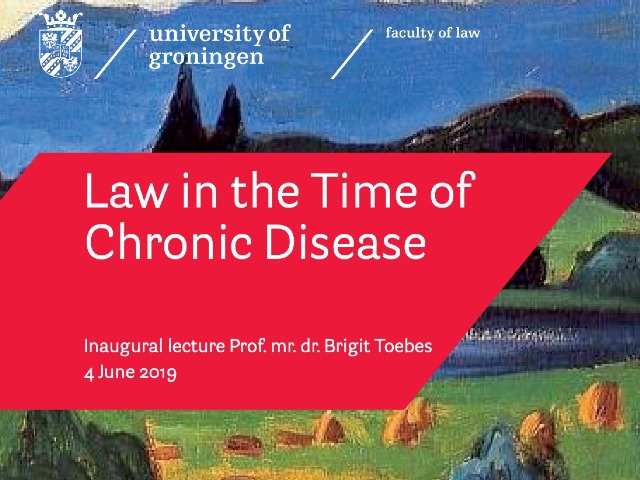Law in the Time of Chronic Disease
| Date: | 20 June 2019 |

Inaugural lecture Prof. mr. dr. Brigit Toebes 4 June 2019
English Summary
Chronic noncommunicable diseases (NCDs) including cancer, diabetes, cardiovascular and respiratory diseases are the most important public health challenge of our times. Four behavioral risk factors are at the root of these diseases: smoking, excessive use of alcohol, unhealthy diet and a lack of physical exercise.
This inaugural lecture addresses the way in which international and domestic law can play a role in reducing these risk factors. Law is a powerful tool to be wielded in the effort to reduce unhealthy behavior in society and has the untapped potential to be applied more effectively in this context.
At the international level, there is the possibility of adopting new treaties regulating alcohol and unhealthy diet, complementing the existing WHO Framework Convention on Tobacco Control. At the domestic level, measures including smoking bans, sugar taxes and a prohibition on the marketing of alcohol are all effective ways to curb unhealthy lifestyles.
This lecture also discusses the way in which regulating unhealthy diets touches upon human rights, including the right to health and the right to autonomy. In addition, attention is paid to the fact that healthy behavior is quite often a symptom of an unhealthy living environment. This discussion will shed light on how law can play a facilitating role in protecting human health in this context .
Dutch Summary
Chronische ziekten als kanker, diabetes en hart- en vaatziekten vormen de belangrijkste volksgezondheidsuitdaging van onze tijd. Vier gedragsrisico’s liggen aan de wortel van deze ziekten: roken, schadelijk alcoholgebruik, ongezond voedsel en gebrek aan beweging.
Deze oratie gaat in op de wijze waarop internationaal en nationaal recht een rol spelen bij het terugdringen van ongezond gedrag in de samenleving. Het recht is een krachtig middel om ongezond gedrag terug te dringen en kan effectiever ingezet worden.
Op internationaal niveau is er de mogelijkheid om verdragen aan te nemen op het terrein van alcohol en ongezond voedsel, in aanvulling op het bestaande WHO-Kaderverdrag inzake de Tabaksontmoediging. Op nationaal niveau zijn maatregelen als een rookverbod, een suikertaks en een verbod op marketing van alcohol effectieve middelen om ongezond gedrag terug te dringen.
De rede besteedt tevens aandacht aan de wijze waarop het reguleren van ongezond gedrag raakt aan mensenrechten als het recht op gezondheid en het recht op zelfbeschikking. Ook komt aan bod dat veel ongezond gedrag veroorzaakt wordt door een ongezonde leefomgeving. Hoe kan het recht daarop inspelen?
The full text of both versions of the speech are available via the link below:

